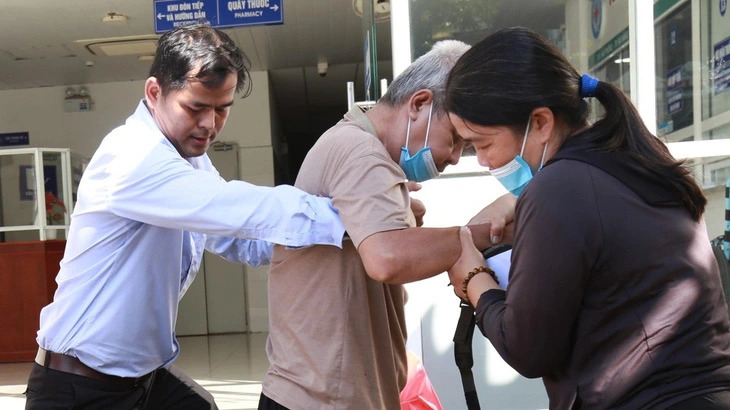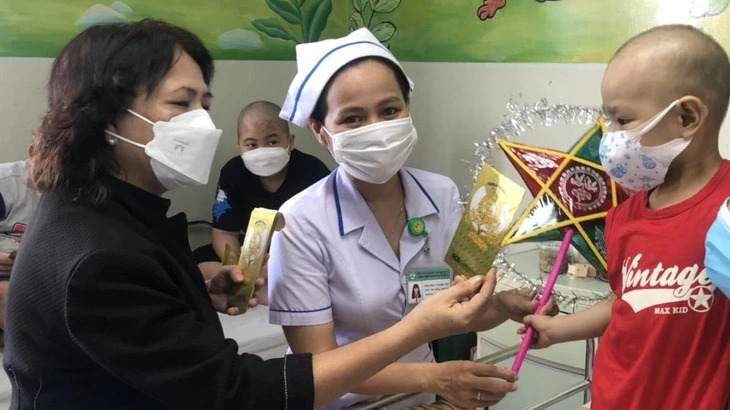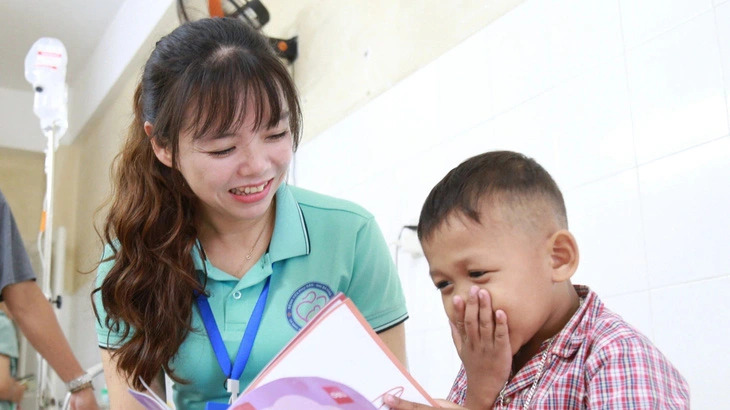Apart from doctors and nurses, social workers who work at many hospitals in Da Nang City, central Vietnam are the glue that holds the lives of underprivileged patients together.
“Miss Binh… Miss Binh!” a young boy, ALang Hai Quan, called Tran Cao Thanh Binh, head of the social work department at the Da Nang Hospital for Women and Children, walking by.
“Look at what Miss Binh got for you,” replied Binh, as she stopped by the boy’s hospital bed and placed a coloring book into his hands.
Quan is a member of the Katuic people, an ethnic minority group that mainly resides in Vietnam, according to Nhan Dan (People) newspaper.
It has been six years since Quan was found to have a rare type of myeloid cancer that caused his sister’s death.
At a cost of VND2 billion (US$80,000), a bone marrow transplant can save Quan’s life, but his poor family from Quang Nam Province, near Da Nang, whose only source of income comes from low-paid manual labor, is unable to raise the fund.
Quan’s parents have been forced to sell their humble family home and rent a small room in the city while they try to keep their son alive.
“It is only thanks to social workers that we can afford his monthly medicine fee, which is not covered by health insurance,” said ALang ARak, Quan’s father.
“They are kind to our son, give him food, treat him like family, and often give him encouraging words or gifts.”
Kindness in the face of death
It is not uncommon for Binh to hold last-minute fundraisers for patients at the hospital.
On one occasion, a poor mother could not afford to hire an ambulance to transfer her child to a hospital in Ho Chi Minh City.
Coincidentally, a group of volunteers was at the hospital handing out gifts to sick children.
“Please give me a few minutes of your time, help this mother save her child,” Binh said to one of the people in the group.
The poor mother then shared her story with the volunteer, who burst into tears and handed her the money for the ambulance fee.
It is impossible to count all of the times that Binh has helped raise money for underprivileged patients.
|
|
| Tra (C), a social worker, connects benefactors to bring gifts to young cancer patients in Da Nang, central Vietnam. Photo: Doan Nhan / Tuoi Tre |
In other situations, patients have been able to receive surgery only because hospital workers have banded together to raise money.
“When you truly empathize with and understand someone’s pain, it is easy to share their story in the most authentic manner possible,” said Binh.
“Real stories can touch the hearts of real people.”
Duty and passion
For Nguyen Dinh Quoc, deputy head of the social work department at Da Nang Hospital, treating patients like family is key to helping them open up and ask for help.
Being the general hospital for all of central Vietnam, Da Nang Hospital attends to thousands of patients daily, spanning a diverse array of backgrounds.
When a disaster strikes, such as a coach accident with dozens of bloodied victims or a home catching fire, it is the responsibility of the social work department to reassure those in need of support.
In addition to helping outpatients and guiding people through procedures, social workers divide their time between inpatients in order to provide any assistance they may need.
Some of these patients are in need of life-saving surgery but do not have health insurance or identification papers with them.
“In such times, a social worker must remain steadfast and alert,” said Quoc.
“They need to make sure the patient is admitted to the hospital and receives treatment, contact the local authorities where the patient lives to verify their identity, and prepare legal documents for treatment fees.”
|
|
| Tran Cao Thanh Binh (L), head of social work at the Da Nang Hospital for Women and Children in Da Nang City, central Vietnam, gives a coloring book to a young cancer patient named ALang Hai Quan (R). Photo: Doan Nhan / Tuoi Tre |
Vuong Thi Thuy Hang, a 32-year-old from Quang Ngai Province in central Vietnam, was recently admitted to the hospital while more than six months pregnant.
She was diagnosed with sepsis, pneumonia, acute respiratory distress syndrome, systemic lupus erythematosus, and other conditions.
Urgent dialysis was needed to save the mother and the child at a cost of over VND100 million (US$4,030).
Yet, after borrowing money from everyone they knew, Hang and her husband realized they were still far short of the money they needed.
Upon learning of Hang’s situation, Da Nang Hospital’s social work department was able to raise nearly VND30 million ($1,200) for her treatment fee as well as get in touch with her hometown in order to complete her insurance process.
“My wife and I were factory workers and lost our jobs a year prior,” Le Pham Duc Anh, Hang's husband, recounted in tears.
“I did not know what to do. My wife was in pain, I had a young child, and we almost could not save the other.
“We were lucky to receive help from the social workers."
When asked, Binh, Quoc, and their fellow social workers all agreed that they were simply doing what they are duty-bound to do.
Fulfilling tasks is simple, but a social worker’s ability to pour their heart and soul into sympathizing with the struggles of strangers is what makes them stand out.
Like us on Facebook or follow us on Twitter to get the latest news about Vietnam!





















































